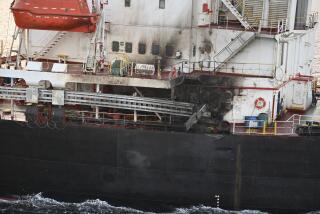Confrontation in the Persian Gulf : Europeans Suspend Gulf Minesweeping Until Smoke Clears
- Share via
THE HAGUE — A European minesweeping flotilla in the Persian Gulf has temporarily suspended operations pending the outcome of the U.S.-Iranian naval confrontation, the Dutch defense minister announced here Monday.
At least 10 Dutch, Italian, Belgian and British warships are involved, Defense Minister Willem van Eekelen said at a meeting here of the seven-nation Western European Union.
Van Eekelen, whose country currently holds the presidency of the union, expressed “grave concern” over the renewed hostilities and reported that Dutch minesweepers had destroyed two mines Sunday and two more Monday in the gulf.
The mines were found, he said, in the same general area where the U.S. frigate Samuel B. Roberts was severely damaged by a mine Thursday. That incident, for which the United States blamed Iran, led to Monday’s naval encounters between Iranian and U.S. forces in the oil-shipping waterway.
Not Taking Sides
Van Eekelen said that cessation of minesweeping activities should not be construed as the taking of sides by the Europeans in the flare-up of hostilities in the gulf. Rather, he said, it reflects the position that the minesweepers and their escorts are in the region to make gulf waters safe and not to become engaged in a shooting war.
Asked whether Washington might disapprove of a halt in the European minesweeping operation, the defense minister said, “The U.S. public will understand that it is not very useful to conduct mine-hunting operations when the bullets are flying.”
Also, British Foreign Secretary Geoffrey Howe said he was “outraged” by an Iranian attack Monday on a Hong Kong-flagged supply ship near an American operated oil rig, which was also struck by Iranian gunboats.
Some British sources said the European minesweepers might resume operations by today, although Van Eekelen suggested that the vessels would have to wait for new orders pending developments in the gulf.
Foreign and defense ministers of Britain, West Germany, France, Italy, the Netherlands, Belgium and Luxembourg are attending the conference.
Monday night, the delegates prepared a formal statement on the events in the gulf that is expected to be issued at a press conference here today. The statement, it was learned, will condemn any action that closes the gulf to international shipping and will call for an immediate cessation of mining or any other kind of interference with freedom of navigation in the gulf.
The British were also pushing for a statement that would approve the “right to take action in self-defense against such activities as mining”--a statement designed to support the U.S. position in the most recent engagements in the gulf.
The Western European Union--a defense grouping whose members are part of the North Atlantic Treaty Organization--supported Washington’s request for assistance in the gulf when the U.S. Navy first beefed up its forces there more than a year ago. That action came after Iran began laying mines in the main shipping channels of the upper gulf off the coasts of Kuwait and Saudi Arabia.
Britain, France, Italy, Belgium and the Netherlands all sent ships to the gulf to participate in minesweeping operations.
West Germany, prohibited by its constitution from using its forces outside Europe, sent its ships to the Mediterranean to relieve gulf-bound British vessels. Even landlocked Luxembourg contributed funds to the Belgian naval effort.
According to Van Eekelen, Monday’s suspension of minesweeping operations involved two Dutch, one Belgian, one Italian and at least two British minesweepers, a Belgian supply ship and two destroyer/frigate-type ships, one Italian and one British.
More to Read
Sign up for Essential California
The most important California stories and recommendations in your inbox every morning.
You may occasionally receive promotional content from the Los Angeles Times.










